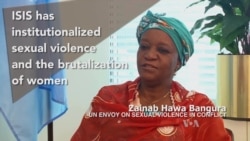A recent trip to the Middle East to meet refugees and survivors of Islamic State violence left the U.N. envoy on sexual violence in conflict in tears.
Zainab Hawa Bangura said the ordeals of women and girls, particularly those of the Yazidi religious minority, were heartbreaking.
“I think one of the first things I recognized and realized during my trip is that this is a war that is being fought on the backs of women and girls,” she told VOA in an interview.
Dire straits
She was told of women and girls who committed suicide by hanging themselves with their headscarves, rather than allowing their abusers to continue raping them. Others slit their wrists, another group swallowed poison.
She said the terror group, also known as ISIS, has subjected women and girls to sexual violence, sexual slavery, forced marriage and other abuses. “ISIS has institutionalized the issue of sexual violence and the brutalization of women,” Bangura said. “They have actually made it a key strategic objective of their campaign. It has become part of the political economy of the war.”
Bangura, the daughter of a Muslim Imam from Sierra Leone, said what the Islamic States preaches is not Islam, “It is not about building Islam. How can you build on the destruction of other people?”
In Iraq and Syria fighters from the self-proclaimed Islamic State are selling captured women in open markets. Bangura said they have even established offices for the sale of women, especially Yazidi women, where females are subjected to inspections to determine whether they are virgins before they are sold.
Unimaginable violence
But she said abuse of women and girls is not confined to Islamic state militants. “Almost all of the extremist Islamist groups have committed sexual violence,” she said, as well as the military and intelligence units of the Syrian government of Bashar al-Assad.
She had an opportunity to visit a Syrian prison which she said resembled a “dungeon,” three stories below ground with no windows. She worried because the guards were male and the prisoners female – making them vulnerable to abuse at the hands of their guards.
Another issue Bangura highlights is the trafficking of refugees in Jordan, Lebanon and Turkey. Eighty percent of that population is women and children. Many are unprotected by male relatives because they have died or gone to fight. Most of the women have never worked outside their homes.
“The global criminal syndicates are actually descending on these countries,” she said, seeking to traffick women and children. She commended the host country governments for working hard to stop these gangs.
She said the Islamic State and other abusers will ultimately face justice, “If I have to fight for it with my last breath, I will.”





